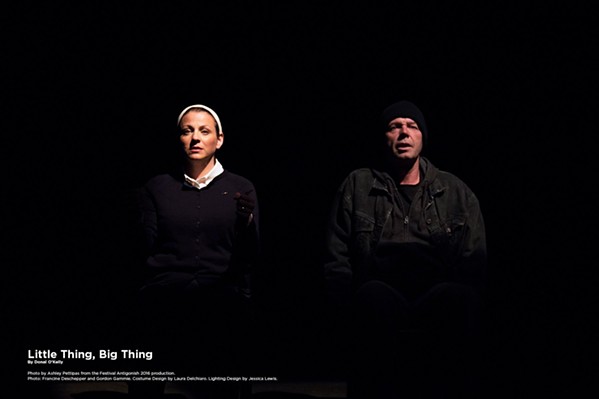Theatre review: Little Thing, Big Thing
Neptune remounts Donal O'Kelly's warped two-hander.
[
{
"name": "Air - Inline Content - Upper",
"component": "26908817",
"insertPoint": "1/4",
"requiredCountToDisplay": "8"
},{
"name": "Air - Inline Content - Middle",
"component": "26908818",
"insertPoint": "1/2",
"requiredCountToDisplay": "8"
},{
"name": "Air - Inline Content - Lower",
"component": "26908819",
"insertPoint": "100",
"requiredCountToDisplay": "1"
}
]
There’s a hell of a lot at work in Little Thing, Big Thing. Resurrected by director Jeremy Webb, the Merritt-winning Neptune take on Donal O’Kelly’s play is a venture jam-packed with hints of Hitchcock-esque suspense riddled with madcap antics and a million different feckin’ uses of the f-word. Between moments of beautiful poetic language and humour, Little Thing, Big Thing strives to tackle the world of international politics and the impossibly long reaches of mega-corporations (in this case the affluent Scarab Oil company). At the end of the day, it’s a warped world that firmly straddles the line somewhere between amazing and alright.
While stealing a statue of the Virgin Mary from an Irish convent, deadbeat ex-felon Larry (Gordon Gammie) meets the iron-willed, headstrong Sister Martha (Francine Deschepper). Newly returned from a missionary trip to Nigeria, Martha is mysteriously charged with an urgent task of delivering a roll of film to a man in Dublin. Easier said than done, nun and convict find themselves pursued by unknown forces who’ll stop at nothing to keep the roll’s contents from seeing the light of day.
Gammie and Deschepper are immediately likeable with their Odd Couple-ish vibe drawing the audience into their zany crusade. Gammie is a hoot as a slimeball seeking redemption. Deschepper, likewise, is a gem as a nun embracing a walk on the wild side. Both also take turns ably playing myriad small supporting characters. I did, however, find the questionable decision to have Deschepper play a Nigerian character, accent and all, very uncomfortable.
Yet as endearing as the performances were, I was not in love with the play as a whole. It takes awhile for the show to kick into gear; the second half loses steam as the show nears its conclusion. It’s also greatly dependent on its oral stage directions, which, despite working so comically well for the show’s first act, get more muddled as the plot thickened. It’s a shame really—had more attention been paid to momentum and clarity, this caper could’ve been a memorable, runaway success.

